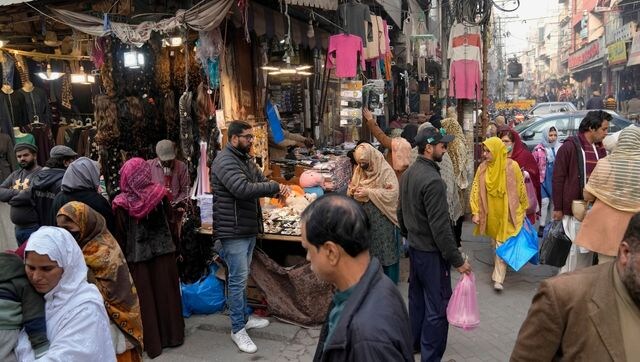What Index? When Pakistanis are fighting it out for flour in streets, how Pak is ahead of India in Global Hunger Index
Looking at current economic crisis in Pakistan - with no respite in the near future as World Bank has cut Pakistan’s GDP growth forecast in half - it seems India's objection to several perception-based indices for their bias, flawed methodology and opacity certainly wasn't 'untrue'

Representational image
New Delhi: Ranked ahead of India in the Global Hunger Index 2022, Pakistan today is facing one of its worst-ever flour crises amid shortage of wheat. The situation is such that people are fighting with each other on roads causing clashes and chaos, while stampedes were reported in Khyber Pakhtunkhwa, Sindh and Balochistan provinces. This indicates that those who published the report did not do their homework well before placing New Delhi (107) behind Islamabad (99).
Looking at the current economic crisis in Pakistan — with no respite in the near future as World Bank has cut Pakistan’s GDP growth forecast in half — it seems India’s objection to the several perception-based indices for their bias, flawed methodology and opacity certainly wasn’t “untrue”.
Global Hunger Index 2022
Indian was ranked 107 out of 121 countries in the Global Hunger Index 2022 with a “serious” score of 29.1. However, what became a matter of debate was that Afghanistan with a rank of 109 was the only country behind New Delhi, while other neighbouring countries – Pakistan (99), Bangladesh (84), Nepal (81) and Sri Lanka (64) fared well.
Taking a strong note of such subjective indices, the Economic Advisory Council (EAC) to the PM came up with a working paper titled, “Why India Does Poorly On Global Perception Indices: A case study of three opinion-based indices-Freedom in the World index; EIU Democracy Index and Variety of Democracy Index” in November last year. It was authored by EAC-PM member and writer Sanjeev Sanyal, and deputy director Akanksha Arora.
With several examples, the paper highlights in detail the absurdity of these indices — they compare nations across the world in terms of democracy, freedoms, civil liberties etc — since countries like Afghanistan, Cuba and Sri Lanka have fared better than India on different parameters.
The common thread in these indices is that they are derived from the “perceptions or opinions of few experts,” the report noted.
“One way to respond to this is ignore these as mere opinions. However, the issue is that they have concrete implications. For instance, these indices are inputs into the World Bank’s World Governance Indicators (WGI) that, in turn, have approximately 18-20 per cent weightage in sovereign ratings. So, they can’t be completely ignored,” the paper explains as to why the indices need to be confronted, rather than just being ignored.
Further justifying his stand, Sanyal earlier tweeted, “Problem is that these opinions find their way into concrete things into sovereign ratings through the World Bank’s WGI index. The growing calls for ESG scores in investment/trade decisions will give opinion-based indices even greater currency. It is time to demand transparency”.
V Dem denies charge
After Sanjeev Sanyal and Akanksha Arora questioned these indices, Staffan Lindberg, the director of Sweden-based V Dem Institute and the principal investigator of V Dem, in an interview with Article 14 said that their accusations were not true.
He claimed that V Dem did not use media reports for the rankings and “used more than 30 experts and a scientific approach that was transparent and involved high math.”
“Their objective was purely academic, not political. They were not biased against India or any other country, and it was impossible to influence them,” he alleged.
India retains GDP growth despite ‘global recession’
Warning of another global recession, the World Bank on Tuesday cur Pakistan’s GDP forecast in half. However, this was the not case with India as the global financial institution has retained New Delhi’s economic growth at 6.9 per cent for financial year 2022-23.
In its Global Economic Outlook report, the World Bank stated, “Growth in India is projected to slow from 8.7% in FY2021/22 to 6.9% in FY2022/23, the latter revised 0.6 percentage point lower since June”.
(With inputs from agencies)
Read all the Latest News, Trending News, Cricket News, Bollywood News,
India News and Entertainment News here. Follow us on Facebook, Twitter and Instagram.
also read

Global recession 'perilously close', but Indian economy to grow at 6.6% in FY24, says World Bank
The World Bank said that the slowdown in the global economy and rising uncertainty would weigh on exports and investment growth in India

Pakistan's economic growth to further 'slow' to 2% in FY2022-23: World Bank
The World Bank forecasts Pakistan's GDP growth rate to improve to 3.2 per cent in 2024, but that too would be lower than the earlier estimate of 4.2 per cent

Hospitals across Pakistan brace for equipment shortage
In 2021, the Drug Regulatory Authority of Pakistan issued Statutory Regulatory Order through which medical equipment and surgical supplies were imported. While the order expired on December 21 last year, the authority has still not issued a new one
